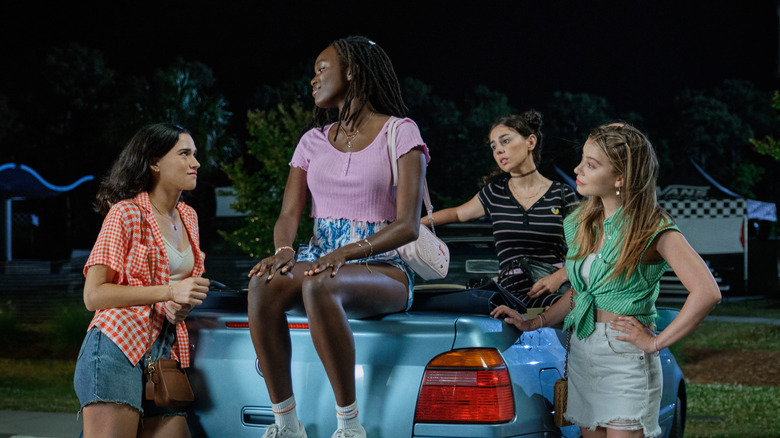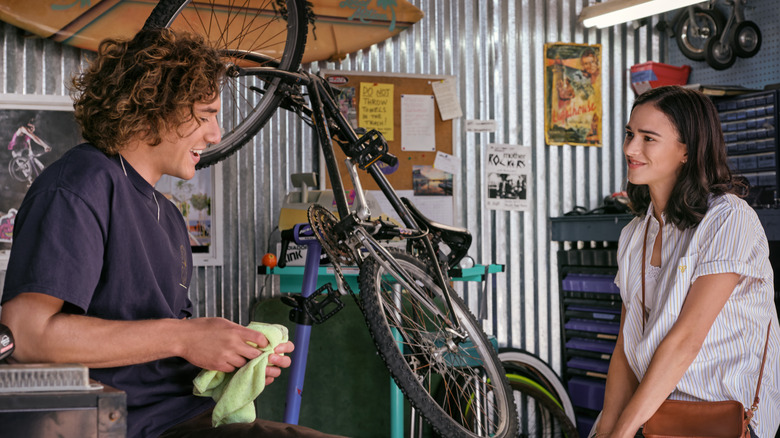Emma Pasarow On The Importance Of Self-Acceptance In Young Women - Exclusive
Self-love, acceptance, and honoring mental health are three of the most crucial things a teenager can strive to achieve for themselves. Yet with the pressures teens face in all walks of life, they're also three of the most elusive states of mind. Plenty of teen movies hone in on the drama of being a young woman — whether it's petty and vindictive feuds with other young women, toxic relationships, or students overworking themselves to death.
Rather than play into those tropes, Netflix's new film "Along for the Ride" shows young fans just how problematic those things can be. In some ways, protagonist Auden (Emma Pasarow) deconstructs other similar films by defying the worst messages in teen movies.
During an exclusive interview with The List, Emma Pasarow explained why the film has young women lift each other up rather than pitting them against each other. She and her on-screen love interest, Belmont Cameli (who plays Eli), also talked about the importance of the mental health arc in "Along for the Ride."
Her character's growth comes from seeing women supporting women
On the sisterhood in the film and whether or not it drew Emma Pasarow to the movie, the actress said, "Absolutely. Auden's relationship [with] all of the women she meets in Colby, as well as her relationship [with] her mother, are really formative in her going from adolescence to adulthood, the summer between high school and college."
While it's common for teenagers to put themselves into boxes, exploring who they are and not limiting themselves is critical. "She learns that we're all more than one thing, especially as women. She comes into Colby feeling like things are very binary," Pasarow added. "You're either a Victoria or you're a Heidi, but then when she comes, she meets these women who are incredibly smart, social, emotionally intuitive, are not afraid to make mistakes, and it's upon meeting them that she's able to grow as well."
In addition to the strong bonds between the women in the film, Auden and Eli work on themselves and their own mental health before jumping into a relationship — another message often absent from teen films. "What's so special is that these are two people who clumsily figure out how to think through their past, create new relationships, and they're not always right," Pasarow explained. "It doesn't always come out right verbally, but through each other and making mistakes and checking each other when communications fail, they're able to figure out how to healthily work through life."
Trauma can be tackled with the help of your friends
Belmont Cameli also had some thoughts on their characters working through trauma and gaining strength and perspective from those around them. "In the relationships that Eli has with Auden and all of the relationships that Auden has with the people of Colby, you're able to grow through these relationships. I thought that was really important," he said. "Even in Auden and Eli's relationship, there's resistance to grow because you're growing closer to somebody, and you may be actualizing a part of yourself that is good for you, [one] that you're not prepared to actualize."
Teen romantic comedies often throw the main characters together at lightning speeds, leading to a relationship based on a rocky foundation that's doomed to blow up after the credits roll. "Along for the Ride" goes in a different direction. "Having that community in Colby, everybody, especially over the course of the summer, [allowed them] to deal with those demons that they had, especially the two of us," Cameli added. "Under the cloak of night that the two of them are able to work through their prior traumas in a healthy and exploratory way, and that was something that I really appreciated via [the] screenplay and novel."
"Along for the Ride" is now available on Netflix.


